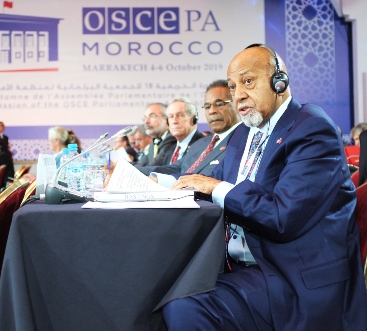Autumn Meeting of the OSCE PA

*NOTE: As prepared for delivery*
Before arriving in Morocco, I led a bicameral and bipartisan Congressional delegation to Tunisia and Israel. While in these countries, my colleagues and I held high-level exchanges with national leadership, civil society, religious leaders, and others to assess the current state of regional security, human rights and democracy.
As a Member of Congress, I spent decades traveling to the Middle East and North Africa. I was never more proud of that engagement, than when I served as President of the Parliamentary Assembly and its Special Representative to the Mediterranean Partners for Cooperation. This trip was an occasion to revisit longstanding relationships and discuss some of the most consequential dynamics impacting the Mediterranean region today.
Our delegation arrived in Tunisia and Israel at sensitive political moments. Tunisia held its second democratic presidential election ever on September 15 and will follow in the coming weeks with its third-ever free legislative election and a presidential run-off.
In Israel, the country’s second national election this year on September 17 once again delivered an ambiguous result, touching off a flurry of government formation negotiations with no end in sight.
In Tunis, my colleagues and I met with Interim President Mohamed Ennaceur. I commended him for leading his country through a historic peaceful transition of power following the death of President Beji Caid Essebsi earlier this year. When I asked about the most serious existential threat facing Tunisia, he had a bracing assessment: that the gravest threat is the economic and social despair afflicting so many youth. We should heed President Ennaceur’s words and commit ourselves during this meeting of the Parliamentary Assembly to discussing ways to restore hope and opportunity for the youth in our societies.
Early next year, I intend to do my part to respond to the call of President Ennaceur and others by hosting young parliamentarians from throughout the OSCE region and the Partners for Cooperation in Washington for a seminar that empowers our future leaders. I look forward to sharing details with your delegations in the near term.
While in Tunisia, our delegation also held roundtables with civil society groups and local and international election observers. I was encouraged by the bold commitment of these groups to preserving and advancing the gains Tunisia has made since 2011 in respect for the rule of law, democracy, and fundamental freedoms. I remain concerned, however, that the ongoing imprisonment of one of the leading presidential candidates could undermine confidence in the democratic process.
In Israel, our delegation met both with Israeli Prime Minister Benjamin Netanyahu and Palestinian Authority Prime Minister Mohamed Shtayyeh. Both leaders were candid in their assessments of the impasse in the peace process. While no clear opportunities emerged, I was affirmed in my belief that parliamentary diplomacy bridges divides. Prime Minister Netanyahu shared his sobering assessment of the global threat posed by Iran and the existential danger it poses to the people of Israel. I hope we will discuss ways of addressing this matter during our debates in the coming days.
During a roundtable with Israel-based civil society, we heard warnings about possible threats to the rule of law impacting both Israeli citizens and Palestinians. In a separate meeting with the leaders of major Christian denominations, including Greek Orthodox Patriarch of Jerusalem Theophilos III, we explored interreligious relations and the mediating role Christian churches play in the Holy Land.
In Luxembourg this summer, this assembly passed a resolution I authored on the importance of integrating and protecting civil society engagement in the work of the OSCE and this Assembly. Our meetings with such groups in Tunis and Jerusalem confirms the value of consulting local activists in our work as parliamentarians at home and abroad.
In the coming days, I urge you, my distinguished colleagues, to continue exploring ways to integrate civil society in our work and to deepen engagement with the Mediterranean Partners, particularly through support for- and observation of their electoral processes.







